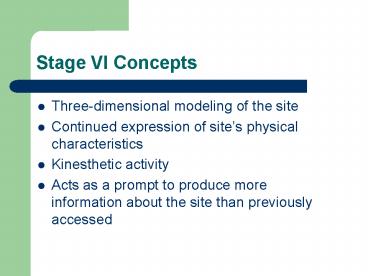Stage VI Concepts PowerPoint PPT Presentation
Title: Stage VI Concepts
1
Stage VI Concepts
- Three-dimensional modeling of the site
- Continued expression of sites physical
characteristics - Kinesthetic activity
- Acts as a prompt to produce more information
about the site than previously accessed
2
Two Functions of Modeling
- Kinesthetic interactions with the site by
describing with 3-dimensional materials that
facilitates the assessment of relative temporal
and spatial dimensional elements at the site - Lowers the liminal threshold to field of specific
locales (time/space)
3
Two RV Modalities
- The detect mode and the decode mode
- Includes behaviors such as writing the
coordinate, rendering a sketch or tracker, then
representing site by 3-dimensional model
construction - Decode kinesthetics are objectifications such as
sensories, and dimensionals
4
Stage VI Discussion
- As viewer proceeds through Stages, contact with
site is enhanced in quality and extent - Stage VI involves viewer in direct 3-D modeling
and assessment of the site and relationship of
site elements to each other - Stage VI may be engaged at stage IV or V
5
Session Mechanics
- As soon as decision is made to proceed to Stage
VI, viewer places in front of him or herself a
modeling material. - Also takes a fresh sheet of paper and writes a
Stage VI matrix as a heading - Stage VI matrix identical in format to IV
- Modeling proceeds
6
Session Mechanics
- Viewer constructs VI matrix. Sets it aside
- Constructs 3-D model of Stage IV Ts and records
information - Focuses attention on signal line, not model
- Objectified information in Stage VI matrix
- Model does not have to be a precise or accurate
rendering.
7
Stage 6 Matrix
8
Conclusions
- Every student has achieved a Stage VI model
- The quality of the model is not important
- The model may be symbolic or representational
- The model is important only in that it gives the
viewer further site information
9
Additional Stages
- Additional stages have been suggested by RV
experts such as Swann and McMoneagle - Stage 7 Telepathy
- Phonics Identification of sounds and letters
- Map Dowsing
- Vectoring
- Covered in CRV Advanced Course
PowerShow.com is a leading presentation sharing website. It has millions of presentations already uploaded and available with 1,000s more being uploaded by its users every day. Whatever your area of interest, here you’ll be able to find and view presentations you’ll love and possibly download. And, best of all, it is completely free and easy to use.
You might even have a presentation you’d like to share with others. If so, just upload it to PowerShow.com. We’ll convert it to an HTML5 slideshow that includes all the media types you’ve already added: audio, video, music, pictures, animations and transition effects. Then you can share it with your target audience as well as PowerShow.com’s millions of monthly visitors. And, again, it’s all free.
About the Developers
PowerShow.com is brought to you by CrystalGraphics, the award-winning developer and market-leading publisher of rich-media enhancement products for presentations. Our product offerings include millions of PowerPoint templates, diagrams, animated 3D characters and more.

